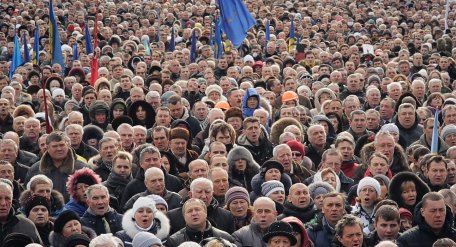"Winter on Fire" is a beautiful and important film. It tells the true story of a stunning show of collective humanity that culminated in a revolution in Ukraine, Europe's largest country and one Americans know next to nothing about. Ukraine's story of its "Euromaidan Revolution" has been all but hijacked by a newly aggressive Russia. "Winter on Fire" takes back their story, with breathtaking scenes from the frontlines on Maidan Square. It's a must-see for anyone who is interested in history, geopolitics, Russia, the Soviet Union, civil rights, collective action, or anyone who wants to experience a powerful human story.
Ukraine today is part of our geopolitical vocabulary, and it’s all because of “EuroMaidan,” a movement that began as a student protest in a public square (“Maidan” in Ukrainian) in the fall of 2013 and ended in the winter of 2014 as the Ukrainian people’s Revolution of Dignity, changing not only Ukraine, but, as it turned out, the world.
The story of those 93 days in Ukraine’s capital is the subject of an electrifying new documentary “Winter on Fire: Ukraine’s Fight for Freedom” by Russian-born American director Evgeny Afineevsky. Fittingly for a film about a people’s revolution, Afineevsky assembled a people’s crew of no less than 28 cinematographers as well as participants and witnesses to chronicle the dramatic events as they unfolded to make history in the streets of Kyiv, giving rise to a civil rights movement that successfully ousted a corrupt political regime.
“Winter on Fire” premiered at the Venice Film Festival to much acclaim and has already received numerous international awards, including a People’s Choice Award and two prestigious awards presented by Ukraine’s president Petro Poroshenko on the anniversary of the EuroMaidan Revolution. Not surprisingly, “Winter on Fire” may be a contender for an Oscar nomination, appearing on several critics’ short-lists of best documentaries of 2015. It's available for streaming on Netflix
, in over 130 countries.
At the center of any film about a people’s revolution is of course the people. And “Winter on Fire” delivers a gripping account as seen through the eyes of a cross-section of participants on the frontlines. As the movement evolved from a protest about European integration to one about European values, Afineevsky takes us along for the sometimes joyous and sometime painful ride, trusting the people in front of and behind the cameras. Rarely does he turn to explanatory narrative. Instead, “Winter on Fire” immerses its viewers in the voices of people and the sounds on the square. Afineevsky artfully intersperses dramatic footage from the streets with interviews of many of those same participants returning to the scene of the events. The film thus moves like a novel, weaving back and forth from elements of narrative to character. In this way, we learn as well as experience the story as it progresses and the participants as they transform through various stages of the Revolution in response to government actions.
“Winter on Fire” also has a gentle, and, at times, haunting original score composed by Jasha Klebe, which helps the audience cope with the more explicit scenes.
Ha ving followed the events at the time, I can honestly say, “Winter on Fire” manages to capture the remarkably inspiring and idealistic spirit exhibited over those many days by the hundreds of thousands of Ukrainians that filled central Kyiv’s Maidan. Everyone was there. People from all walks of life came to Maidan, from different cities and regions and even beyond Ukraine’s borders. Young, old, soldiers, teachers, hipsters, engineers, doctors, professionals. Even runaways, like the streetwise 12-year old boy who seemed to grow up before our eyes on the barricades. There were Russian speakers and Ukrainian speakers. Muslims, Christians and Jews worked together. People set up kitchens so no one was hungry. There were tents dedicated to media and charging cell phones and technical equipment. Concerts, speakers, poets, politicians came to the stage in an orderly manner. Schedules were posted of events daily. Everything seemed to work like a well-oiled machine.
ving followed the events at the time, I can honestly say, “Winter on Fire” manages to capture the remarkably inspiring and idealistic spirit exhibited over those many days by the hundreds of thousands of Ukrainians that filled central Kyiv’s Maidan. Everyone was there. People from all walks of life came to Maidan, from different cities and regions and even beyond Ukraine’s borders. Young, old, soldiers, teachers, hipsters, engineers, doctors, professionals. Even runaways, like the streetwise 12-year old boy who seemed to grow up before our eyes on the barricades. There were Russian speakers and Ukrainian speakers. Muslims, Christians and Jews worked together. People set up kitchens so no one was hungry. There were tents dedicated to media and charging cell phones and technical equipment. Concerts, speakers, poets, politicians came to the stage in an orderly manner. Schedules were posted of events daily. Everything seemed to work like a well-oiled machine.

“Winter on Fire” is not only about the power of ordinary people to mobilize and effect extraordinary societal change. It’s also about a people's internal journey, coming to believe in a power they don’t even recognize they possess until something awakens it. It could be someone touching a hand to start a human chain. It could be sparked by music, performed by professionals and amateurs alike on the square. It could be hearing and joining in singing of the national anthem. It could be witnessing something so shocking to the conscience, human instinct takes over. In all of these cases, as the film demonstrates, the instincts that emerged on Maidan, even under crisis conditions, brought people together rather than divide them.
Things could easily have gone very differently. For most of those 93 days, the atmosphere was overwhelmingly positive, like being at a festival. But as the riot police began beating people indiscriminately, Maidan’s numbers only grew as did Maidan’s spirit. “Winter on Fire” puts that spirit on full display. And it is that powerful blend of unity, diversity, purpose, determination, fairness, ingenuity, resourcefulness, courage, and dignity that over the course of 93 days forged a new identity for Ukrainian citizens and Ukraine as a new European nation.
“Winter on Fire” is in some ways an uncharacteristic film for our time. We live in a time where revolutions fail and revolutionaries get beheaded. This is precisely why this film is important. During less than optimistic times, “Winter on Fire” brings hope to struggles for freedom and democracy throughout the world. It is a very real and hopeful story, one with much raw pain, yes, but hopeful nonetheless.
I had a chance to meet Evgeny Afineevsky at a screening of “Winter on Fire” in Los Angeles this week during the presentation of the Mirror of the Freedom Award. He spoke of his approach as apolitical, of being a filmmaker and a documentarian of history whose aim was to tell a human story, the story of “93 days that changed the world.” Afineevsky also admitted to me that he’s regrettably lost some friends in Russia for his on screen testament to the events as they happened in Ukraine.
Read more: “Winter on Fire” director given “Mirror of the Freedom Award”

Although the director didn’t set out with an agenda, he recognizes that his film also counters various myths and propaganda about what really happened on Maidan, without sugar-coating the violent last days. EuroMaidan was no uprising by violent extremists who staged a coup d'etat. Rather, "Winter on Fire" shows Maidan was an expression of our collective humanity at its highest levels, people uniting in a universal desire for a voice, for a government that's accountable, for a society that's fair and decent, for a future of dignity for your children.
Read more: Russian-born director risking his life to deliver Oscar worthy documentary
Ukraine is fighting for the same fundamental values of civil societies in democracies like ours. The Mirror of Freedom Award presented to Afineevsky explicitly recognizes the undeniable link between Ukraine's revolution and America's own founding in its dedication: “'Winter on Fire' inspir[es] Americans to think about our own significance regarding what freedom really means. In a sense, the heroes of the Maidan in Ukraine can be seen as the ‘living hearts’ of the American Founding Fathers, an embodiment of our American values.”
The universal theme in Afineevsky’s "Winter on Fire” is what makes Ukraine’s fight for freedom important for Ukrainians and non-Ukrainians alike. At a time when cynical American and European politicians exploit people’s fears and differences, it’s easy to take our values for granted. Watching the remarkable Ukrainians in “Winter on Fire” reminds those of us in countries that have fought our battles for equality and dignity, that there is still much work to be done, that civil rights and democracy require constant effort and struggle.
Afineevsky reminds us that we cannot be complacent, and that even mature democracies have much to learn from the struggle of a far away and little-known country. "Winter on Fire" shows us that by focusing on our best values, as the people of Ukraine did on Maidan, success on seemingly intractable fronts can be within our reach too.





